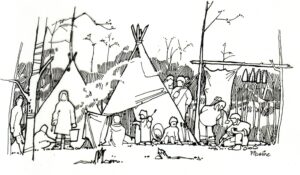
I’ve been working on a text about life in Mesolithic Scotland for a teaching resource. It has got me thinking about one of my favourite subjects: the ways in which our life differs so much from that of our Mesolithic ancestors and yet we still value skills that would have been very familiar to those who made their home here eight thousand years ago.
Today, we are accustomed to the home comforts that support our lifestyle. We take them for granted: central heating; hot water; sophisticated bathrooms and kitchens; an abundant and diverse diet; the convenience of shops that can provide for our every need, and transport at the touch of a button. While it is true that contemporary society accommodates a remarkable disparity between those with access to plenty of money and those who manage on very little, it is also the case that all aspire to certain elements of life and those who direct the apportioning of resources generally seek to facilitate a certain standard of living that makes use of aspects of the elements mentioned above.
Yet most of us have little idea of the processes behind them. The generation of electricity, the production of our complex foodstuffs, and the building of our houses all remain, by and large, a mystery and few of us possess the knowhow to create these for ourselves. The exigencies of dense populations and dwindling resources mean that even in extreme situations, such as most refugee camps, the authorities ensure survival by working to maintain distribution networks rather than facilitating on the spot production. For those of us lucky enough to live within the urban west (and I include myself here in Orkney because the landscape of my home is nothing if not created by its human population) it has become hard to imagine a world in which these ‘basic essentials’ did not exist. It is hard to conceive a world in which individuals had to provide for themselves.
We have lost many of the links to nature that were once a fundamental element of life. Many of us only notice the passing of the seasons as a backdrop against which our lives play out. We go for a walk on a sunny day, we seek relaxation on a beach in the summer, when it rains we go indoors, winter storms will lead us to turn up the central heating and light the stove. Yet these links were once a vital part of our survival. Through them we understood when and where to seek for certain foods. We recognised the need to prepare and store a surplus to see us through the winter. We appreciated the qualities of different woods that allowed us to burn a long slow fire through a winter’s night, or a hot fire for cooking, a smoky fire to preserve meat. Today, we have forgotten the way in which the world (nature, weather, seasons), once ruled our daily routines.
I find it fascinating, therefore, that, as we apparently become more distanced from the world in which we live, we have, on the other hand, increasingly come to appreciate the skills of bushcraft. Foraged foods have become an increasingly popular part of exclusive restaurants and people will pay a lot to spend a few days learning ‘survival techniques’. There is a plethora of books on the subject and it is a frequent element of television, from straightforward educational programmes to a slightly weird component of some reality tv.
Where, you might well ask, is this all leading? By combining an understanding of the archaeology with knowledge of the ways of woodland and countryside, we can begin to approach and understand those of our earliest ancestors for whom these things were second nature. Maybe that is a bit purist. I feel that it also helps us to appreciate and think more about how we live today. What we have got. How we use resources. Perhaps it helps us to feel at one with the world. The success of technology over the last few millennia has led us to become distanced and complacent. We need to retrace our steps.
You must be logged in to post a comment.